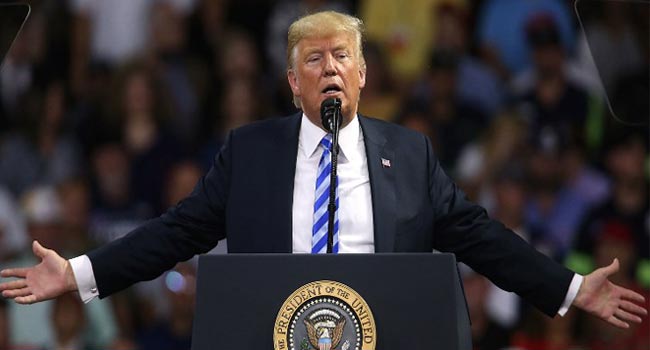Asian shares came under renewed pressure on Friday as a report U.S. President Donald Trump was preparing to step up a trade war with Beijing sent Chinese stocks lower and partially erased gains made in this week’s global rally.
Oil prices rose on growing evidence of disruptions to crude supply from Iran and Venezuela and after a fall in U.S. inventories.
Brent crude oil traded almost flat at 77.70 dollars a barrel, while U.S. crude stood at 70.26 dollars a barrel, little changed from previous close.
At early trade on Friday, Brent crude oil was 77.51 dollars. U.S. crude was 70.04 dollars a barrel.
Many emerging market currencies were also frail after Argentina’s peso sank on Thursday despite the central bank’s interest rate hike.
European shares are expected to open lower, with major European stock index futures falling 0.2 per cent in early trade.
MSCI’s broadest index of Asia-Pacific shares outside Japan dropped 0.7 per cent, for monthly drop of 1.5 per cent.
The index has underperformed MSCI ACWI, a gauge of the world’s 47 markets, for four months in a row as Sino-U.S. trade worries hit Chinese shares.
The Shanghai composite index had fallen to near a 2-year low hit earlier in the month, but recovered some of the day’s losses later in the session.
Trade jitters dominated market sentiment, indicators suggests activity in the world’s second largest economy remained firm.
The official Purchasing Managers Index (PMI) on Friday showed growth in China’s manufacturing sector unexpectedly picked up in August after a two-month slide.
Still, investors remained cautious as they expect more risks from the trade frictions down the road.
Japan’s Nikkei closed down 0.02 per cent.
U.S. S&P500 e-mini futures were slightly weaker a day after the S&P 500 lost 0.44 per cent from Wednesday’s record close of 2,914.
Cautious mood helped lift the yen, which rose 0.6 per cent on Thursday, its biggest daily rise in about six weeks. In Asian Friday trade, it stood flat at 110.98 per dollar .
The euro was little changed at 1.1665 dollars, having shed 0.33 per cent in the previous session.
The common currency has recovered from a 13-1/2-month low of 1.1301 dollars hit in mid-August, but looks set to end the month little changed from end-July.
Emerging market currencies had less luck, with currencies relying on foreign capital to finance their current account deficit hit the hardest.
The peso, the world’s worst-performing currency this year due to the country’s poor economic health, fell 10 per cent on the day, bringing its month-to-date losses to 27 per cent.
Argentina’s central bank at an emergency meeting on Thursday voted unanimously to raise its benchmark rate to 60 per cent from 45 per cent, however, the unexpected move failed to stabilise the peso.
The Turkish lira, which has been hit by concerns over President Tayyip Erdogan’s interference in monetary policy and his diplomatic spats with Washington, also slipped towards record low marked about two weeks ago.
The lira bounced back more than two per cent to 6.4992 per dollar in volatile trade, though it has fallen nine per cent so far this week.
It was hit lately by reports that central bank deputy governor was leaving the bank.
In Asia, the Indonesian rupiah fell to three-year low even as the country’s central bank said it was “decisively” intervening to support the currency. The rupiah has lost two per cent so far this month.
The Indian rupee hit a record low, having fallen 3.4 per cent so far this month.(Reuters/NAN)

